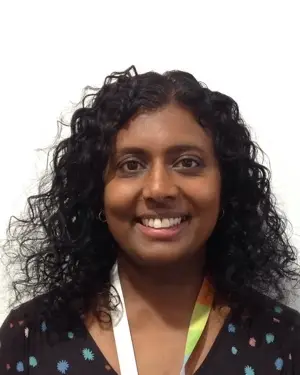Does children’s ethnicity affect their cancer treatment and survival?
Henrietta Owusu-Ansah knew something was wrong. Her baby Francesca’s eyes were rolling. Her tummy was starting to protrude slightly.
Then she stopped breathing and started foaming at the mouth.
As a mother of three, Henrietta knew to trust her instincts. Although Francesca quickly recovered, they rushed to their nearest A&E.
The doctors and nurses said it was probably nothing to worry about, but they kept Francesca in over the weekend. They did lots of tests. Henrietta’s fears were right.
“She had a huge tumour that was basically taking over her whole torso,” Henrietta explains.
Francesca had neuroblastoma, a rare cancer that affects children. It was advanced, stage four, meaning it had already spread.
“It had spread through her diaphragm, her bones, her skull,” says Henrietta. “That’s why I could see her eyes rolling, because it was really affecting her all over her body.”
Francesca wasn’t even one year old when she had a nine-hour operation to remove the tumour.
By the time her cancer was no longer detectable, Francesca had missed many developmental milestones. But she survived, and is now 10.
“She’s doing well,” says Henrietta. “She has a few learning issues, but generally she’s happy child.”
Assessing cancer outcomes
Henrietta wanted to give something back.
She joined the Paediatric Oncology Reference Team (PORT), a group of parents who use their own experience of having a child with cancer to help researchers. That was how she came to be involved in Dr Jessica Bate’s research.
Jessica, a Paediatric Oncology Consultant at University Hospital Southampton (UHS), was putting together a proposal for a new national study into children’s ethnicity and their cancer outcomes.
She decided to do the project after a study in Yorkshire found that South Asian children with lymphoma had a 15% lower chance of survival compared to non-South Asian children across a 20-year period. She wanted to know if this was true across the UK.
Her aim was to co-produce the study, designing and conducting the study in partnership with parents from the start. Through PORT, she found four parents of children with cancer, including Henrietta.
Each was from a different ethnic group, lived in a different part of the UK, and brought different experiences.

Milan’s story
Gita Patel’s experience was very different to Henrietta’s.
Her son, Milan, was 11 when he was diagnosed with Ewing Sarcoma, a cancer of the bone and tissues. They tried every possible treatment, even travelling to the USA for proton therapy.
“These are very, very harsh treatments,” says Gita. “To have to undergo one cycle of chemo is bad enough, but to have 14 cycles of chemo as an 11-year-old… why does it have to be so toxic?”
Yet, despite all they went through, it wasn’t enough.
“After three years or so, and lots of different treatments, we sadly lost him,” she explains.
‘Research is the answer’
Gita, Henrietta and the other parents are part of Jessica’s research team. Their contribution has greatly influenced a recently submitted Cancer Research UK grant application. It’s just the start.
“This is step one of a much, much bigger piece of work,” Jessica explains, “which will help us understand more about any inequalities in the treatment pathways and survival in different ethnic groups. If we do find any differences, we will need to think about how best to address them”
Yet she’s only had the time, training and confidence to do this because she’s part of the UHS Research Leaders Programme.
“I’d never have contemplated doing a study like this three years ago,” says Jessica, “to lead an expert team of professionals and parents from across the country to design and plan this important piece of research.”
Now, having secured an NIHR Senior Clinical and Practitioner Research Award that provides 50% protected research time over the next five years, she’s well set up. Henrietta and Gita are completely behind her.
“Research is the answer,” says Gita, “and the only way you can do that is by giving people like Jessica the time, through initiatives like this programme.”
Find out more about the UHS Research Leaders Programme here.